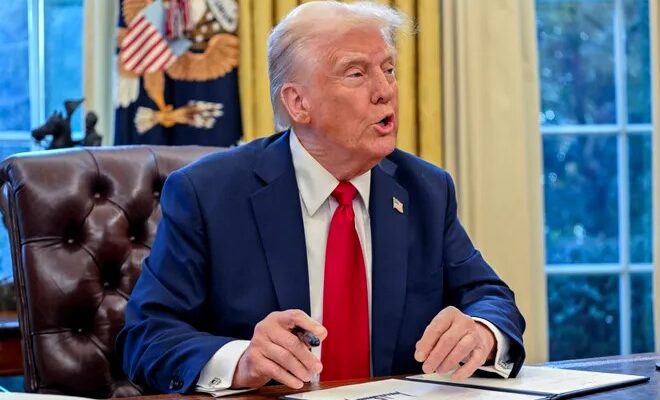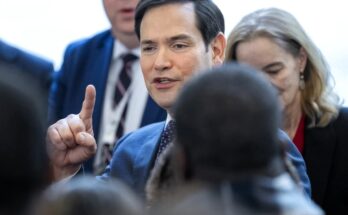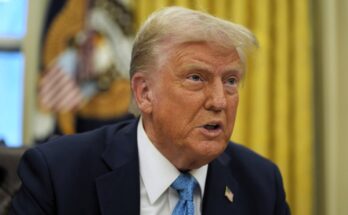WASHINGTON ― President Donald Trump said Friday he will impose 25% tariffs on imports from Canada and Mexico beginning Saturday, following through on a controversial move he says is aimed at pressuring the two neighboring countries to halt the flow of migrants and fentanyl across their borders.
Trump said he will also impose an additional 10% tariff on goods from China. The new tariffs on imports from all three nations ‒ which are on top of existing tariffs ‒ will go into effect Saturday, the White House said.
“China makes the fentanyl, gives it to Mexico, puts it through Canada, puts it through different places, mostly Mexico, but also a lot through Canada,” Trump said. “And so all three haven’t treated us very well.”
Addressing reporters in the Oval Office, Trump also vowed to impose blanket tariffs on all oil and gas imports by Feb. 18. He reiterated plans to place sweeping tariffs on metals such as steel and cooper as well as semiconductors, pharmaceuticals and other goods. He also said he will impose tariffs on goods from the European Union at a later time.
“Absolutely, the European Union has treated us so terribly,” Trump said.

Economists warn tariffs, which are taxes on foreign imports, can lead to higher prices for consumers. Trump campaigned on promising to bring down inflation. But 11 days into his second term, Trump has shown he plans to use tariffs ‒ a hallmark of his first term ‒ as a tool to achieve both his foreign policy aims and domestic agenda.
Trump said the tariff on oil imports from Canada would likely be set at a lower rate of 10%. He said there’s nothing Canada and Mexico can do to stop his actions on tariffs. “No, not right now,” he said.
“You see the power of the tariff,” Trump said. “Nobody can compete with us because we have by far the biggest piggy bank.”
He downplayed the impact on American consumers. “Tariffs don’t cause inflation. They cause success,” Trump said. “There could be some temporary short-term disruption, and people will understand that.”
Canadian Prime Minister Justin Trudeau said Friday that Canada would respond forcefully to Trump’s tariffs, signaling a potential for a trade war between the two North American allies.
Because more than 75% of Canada’s goods and service exports go to the United States, Trudeau said the tariffs could have significant repercussions on the Canadian economy.
“I won’t sugarcoat it ‒ our nation could be facing difficult times in the coming days and weeks,” Trudeau said.
Besides crude oil, other major U.S. imports from Canada include wood and lumber, plastics, charcoal, aluminum, paper books, and iron and steel appliances.
Trump threatened the tariffs on Canada, Mexico and China shortly after he won the November election but did not impose the tariffs on the first day in office as he originally pledged.
Earlier this week, Trump announced plans to impose tariffs on all steel, aluminum and copper imported to the U.S. as well as goods such as computer chips, semiconductors and pharmaceuticals in a push to increase U.S. production of the products.
“We have to bring production back to our country,” Trump said.
Trump said he hasn’t settled on a figure for the tariffs on the metals and other goods.
Meanwhile, Trump has also signaled he still plans to pursue a baseline universal tariff for all imports ‒ something he talked about during the 2024 presidential campaign. Trump’s treasury secretary, Scott Bessant, is pushing a universal 2.5% universal tariff, the Financial Times reported, that could eventually reach the 20% tariffs Trump pledged on the campaign trail. But Trump said he wants a a universal tariff rate to be “much bigger” than 2.5%.



